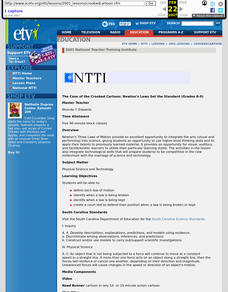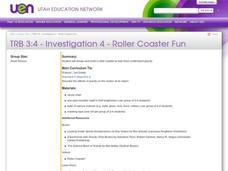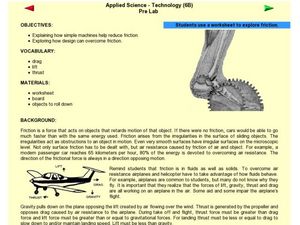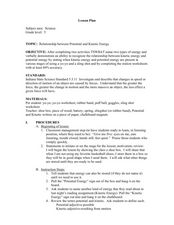University of Colorado
Distance = Rate x Time
Every year, the moon moves 3.8 cm farther from Earth. In the 11th part of 22, classes use the distance formula. They determine the distance to the moon based upon given data and then graph Galileo spacecraft data to determine its movement.
Curated OER
Super Gelatin
Learners investigate the refraction properties of gelatin to calculate its index of refraction. They discover that as the light travels through the gelatin, its speed and wavelength also change. Students find th indes of refraction of an...
Curated OER
Boarding School
Pupils discuss conservation of energy using a skateboarder in the halfpipe or a person on a roller coaster as an example. Using mathematical equations, students examine potential and kinetic energy of the examples. Lesson is completed...
Curated OER
Avalanche!
Students explain that when forces on an object are balanced, the motion of object does not change. They describe how an object changes its motion when forces on it are unbalanced. They plan and conduct a scientific investigation to test...
Curated OER
The Science of Hurricanes
Students are introduced to the science of hurricanes in an effort to highlight how forces change the speed and direction of motion.
Curated OER
Velocity, Acceleration, and Gravity
Students perform an experiment where a string is tied across the room. A straw is threaded onto the string, and a balloon attached to the straw. Students determine the speed of the balloon as it moves across the string. They repeat the...
Curated OER
Marble Madness
Students determine the velocity of a marble rolling down the incline. In this physics lesson, students identify the independent and dependent variables in the experiment. They construct and analyze a graph.
Columbus City Schools
It’s All Relative
Are the people on the other side of the world standing upside down? Pupils discuss the relationship between movement and position words. The unit explores the concept of reference points through animation, modeling, photography, and...
Teach Engineering
The Great Gravity Escape
Groups simulate an orbit using a piece of string and a water balloon. Individuals spin in a circular path and calculate the balloon's velocity when the clothes pin can no longer hold onto the balloon.
Cornell University
Physics of Flight
Up, up, and away! Take your classes on a physics adventure. Learners explore the concepts important for flight. They experiment with the Bernoulli Principle while learning the forces that act on airplanes in flight.
Curated OER
The Case of the Crooked Cartoon: Newton's Laws Set the Standard
Students have the opportunity to use higher-level thinking skills and to apply their talents to previously learned material. It provides an opportunity for visual, auditory, and tactile/kinetic learners to utilize their particular...
Curated OER
Quick Beat
Young scholars move in a variety of ways such as speed walk, jump, skip, gallop, crab walk, crawl (on mats or grass), slide, walk backwards, etc. Write terms on a large poster. Writing should be large enough for students in a group to...
Curated OER
Building a Roller Coaster
Students describe the law of conservation of energy. They identify the conversion between potential and kinetic energy. They investigate and describe the application of Newton's Laws of Motion.
Curated OER
Elevator Height as Integral of Velocity
Pupils investigate integrals and their relationship to velocity in this calculus lesson. They use the idea of a moving elevator to explore vertical motion and use the TI to help them create a visual.
Curated OER
A Steep Hike
Students explore slope. In this middle school mathematics instructional activity, students analyze and interpret graphs as they investigate slope as a rate of change. Students use a motion detector to collect data as they...
Curated OER
Match Me!
Young learners explore motion graphs in this activity. They investigate distance-time plots as they move in a specific way in front of the CBR in an attempt to make a motion plot that matches a given plot. Pupils explore the connections...
Curated OER
Walk the Line
Learners create constant speed versus motion graphs. They will perform linear regressions on their data to describe the graphs mathematically.
Curated OER
What is a Wheel and Axle?
Stuents explore wheels and axles and how they maka machine move. After a teacher demonstration, young scholars construct a wheel and axle. Students explore the circumference of the wheel. They compare the wheel sizes, speed, distance,...
Curated OER
Roller Coaster Fun
Third graders review the effects of gravity on how objects move. In groups, they design a roller coaster and share it with their classmates. Using materials given to them, they build their roller coaster and let a ball roll on the...
Curated OER
Applied Science - Technology (2A) Post Lab
Second graders explore simple machines. In this technology instructional activity, 2nd graders look at pulleys and gears and what the uses are for each. They complete a worksheet comparing the two.
Curated OER
Applied Science -Technology (6B) Pre Lab
Sixth graders discuss how simple machines overcome friction. In this simple machine lesson, 6th graders review the parts of a plane and how they make up for gravity and friction. They roll different objects down an inclined board...
Curated OER
Relationship between Potential and Kinetic Energy
Fifth graders explore the relationship between potential energy and kinetic energy. In this energy lesson plan, 5th graders examine objects and describe potential and kinetic energy of the objects. Students complete two...
Curated OER
Newton's Laws: Making Simple Rockets
Students can use rocketry to understand Newton's Three Laws of Motion.
Curated OER
Selling The Molecular Kinetic Theory
Students investigate molecule movement according to the kinetic molecular theory. In this kinetic molecular theory lesson plan, students observe demonstrations showing that molecules speed up with increasing temperature and slow down...

























